Photo by Suzy Hazelwood
Vowing to write four or five books during the pandemic is one of those declarations that sound impressive—and almost realistic—because who doesn’t want to make up for lost time and come out of a bad situation better off than when things started? However, making such promises or pushing ourselves to the brink can never end well because we’re ultimately faced with two challenges: How do we juggle the creative struggle with our daily lives, and how do we sustain such a daunting pace for the long haul? Obviously, the answers are different for every person, but I have found that optimizing one’s productivity is often more about working smarter than working harder. Therefore, I have curated a list of productivity books geared toward writers that emphasize stress reduction and creative renewal. You will find that none of these books are new or even innovative in their ideology, but each of them offer the common sense kick in the pants every author needs to avoid burnout and build a career that will last a lifetime.
![]() ‘Dear Writer, You Need to Quit’ by Becca Syme
‘Dear Writer, You Need to Quit’ by Becca Syme
Becca Syme is a Gallup-certified strengths coach, USA Today bestselling author, and founder of the Better-Faster Academy where she helps writers maximize their success by identifying which productivity methods align with their personalities. However, she is probably best known for her QuitCast for Writers Podcast where she discusses the things authors need to stop doing in order to discover the least painful path to success. Like her podcast, this book goes in-depth about the most common writer pitfalls and why we should avoid them. Expect to read about things like the unfounded obsession with writing a book a month and the detriment of measuring our progress against those around us. This work is also the first installment in her five-volume QuitBooks series that covers other author issues such as how to avoid burnout, how to overcome writer’s block, and how to foster creativity during tough times. Syme’s work is essential for anyone who desires the truth about self-sabotage and self-care.
Get Dear Writer, You Need to Quit at Bookshop or Amazon
![]() ‘The Power of Habit: Why We Do What We Do in Life and Business’ by Charles Duhigg
‘The Power of Habit: Why We Do What We Do in Life and Business’ by Charles Duhigg
Consistency is key when mastering an artform, and Duhigg’s work suggests that in order to reach success we must first understand our habits. His book teaches us how to identify the self-defeating ones as well as how to replace them with better behaviors through small shifts in our standard routine. By identifying the underlying tasks of each habit, we can pinpoint what drives our actions and what need the habit is trying to fill. From there, we can make an active choice toward a more positive solution. This technique is essential for creatives who tend to procrastinate on their writing with excuses that they never have enough time or they need a larger platform when the truth is they haven’t pinpointed the most important aspects of their work and what they hope to get out of each endeavor. Duhigg is also the author of Smarter Faster Better, which outlines eight productivity concepts—such as innovation, goal setting, and the honest examination of results—and explains why some people are able to get more accomplished than others.
Get The Power of Habit at Bookshop or Amazon
![]() ‘Overwhelmed Writer Rescue: Boost Productivity, Improve Time Management, and Replenish the Creator Within’ by Colleen M. Story
‘Overwhelmed Writer Rescue: Boost Productivity, Improve Time Management, and Replenish the Creator Within’ by Colleen M. Story
Story uses her background as a wellness writer for publications such as Healthline and Women’s Health to put a unique mental fitness spin on why artists experience overwhelm and self-sabotage. Her techniques on how to expand our writing time and sustain creativity are the perfect roadmap for professionals who feel bogged down by deadlines or beginners who need motivation to stay the course when the road gets rough. Some of her tips include clearly defining our goals, chunking them down into three small tasks per week to avoid burnout, and rewarding ourselves for even the smallest success as a way to train the brain to see writing as fun. She also identifies seven productivity saboteurs, like perfectionism and self-doubt, and outlines how to conquer them in favor of confidence and consistency. Basically, any writer who feels stalled due to a lack of passion for the craft should invest in this book to learn how to get unstuck.
Get Overwhelmed Writer Rescue at Bookshop or Amazon
![]() ‘The Artist's Way: A Spiritual Path to Higher Creativity’ by Julia Cameron
‘The Artist's Way: A Spiritual Path to Higher Creativity’ by Julia Cameron
Many know Cameron from the concept of “morning pages,” but this book also provides a twelve-tiered approach to unblocking the things that staunch creativity. For example, Cameron recommends every writer find at least an hour a week to spend on a creative endeavor that isn’t writing. She calls this the "artist's date," and I believe this renewal of the creative well allows us to see things differently and more deeply. Such an activity is essential during periods like our current pandemic where writers are often overextending themselves in order to take advantage of the additional time allotted during quarantine. Another one of her key tips is the “creative cluster,” similar to the master mind group concept attributed to Napoleon Hill, where like-minded individuals come together to support each other in their artistic endeavors. Cameron’s words were originally published in 1992, but her concepts are more relevant than ever. I highly recommend this work to anyone seeking writer-related tips on self-care and artistic passion.
Get The Artist's Way at Bookshop or Amazon
![]() ‘The Practice: Shipping Creative Work’ by Seth Godin
‘The Practice: Shipping Creative Work’ by Seth Godin
Although more a blog compilation than a cohesive book, Godin reminds us that consistency gained through honing our craft is far more important than chasing trends, and that success will come to those who commit to their passion. One of the passages I found most illustrative of these deceptively simple concepts is his anecdote on learning to juggle. He states that most people fail because they lunge out of position in order to catch the next ball. When we move away from the methods and practices that bring us results to lunge after what everyone else is doing, we lose our momentum and never gain progress in the areas best suited for our growth. This disconnect causes the kind of emotional pain that ends careers, and Godin believes writers interested in building a long-standing backlist should learn the difference between risks worth taking and risks that simply put us out of alignment.
Get The Practice at Bookshop or Amazon
Even though each of these books have a specific philosophy about productivity and maximizing one’s potential for success, it’s up to you to find a stress-free way to make that path your own. Remind yourself daily why you want to be a writer and define what success means to you. Once you’ve established your motivations, designing an action plan will be easier, succumbing to burnout will be less likely, and setbacks will seem less daunting because your impulse to succeed will have purpose.
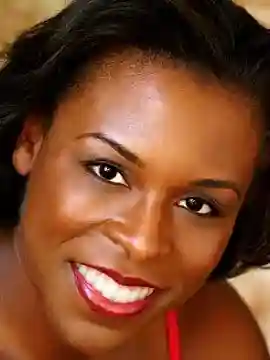
About the author
Andrea is a writer and editor who specializes in mystery and romance. She holds a creative writing M.F.A. from Seton Hill University and a copyediting certification from UC San Diego. Her craft essays can be found on several websites such as Funds for Writers, DIY MFA, and Submittable. She also writes book reviews and entertainment news for the women's lifestyle website Popsugar and is the author of the Victoria Justice Mysteries by Polis Books. These killer courthouse cozies follow a young stenographer who realizes her transcripts hold the key to solving a string of murders (think Law & Order meets Murder, She Wrote). To learn more about Andrea’s work, visit ajthenovelist.com or follow @ajthenovelist on Twitter.
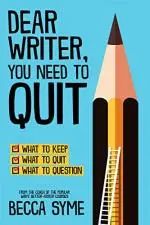 ‘Dear Writer, You Need to Quit’ by Becca Syme
‘Dear Writer, You Need to Quit’ by Becca Syme
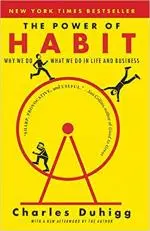 ‘The Power of Habit: Why We Do What We Do in Life and Business’ by Charles Duhigg
‘The Power of Habit: Why We Do What We Do in Life and Business’ by Charles Duhigg
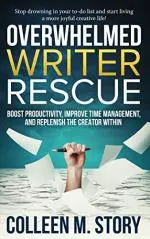 ‘Overwhelmed Writer Rescue: Boost Productivity, Improve Time Management, and Replenish the Creator Within’ by Colleen M. Story
‘Overwhelmed Writer Rescue: Boost Productivity, Improve Time Management, and Replenish the Creator Within’ by Colleen M. Story
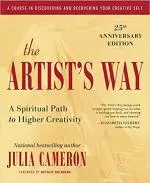 ‘The Artist's Way: A Spiritual Path to Higher Creativity’ by Julia Cameron
‘The Artist's Way: A Spiritual Path to Higher Creativity’ by Julia Cameron
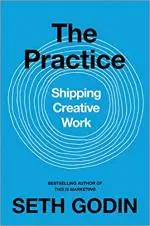 ‘The Practice: Shipping Creative Work’ by Seth Godin
‘The Practice: Shipping Creative Work’ by Seth Godin








